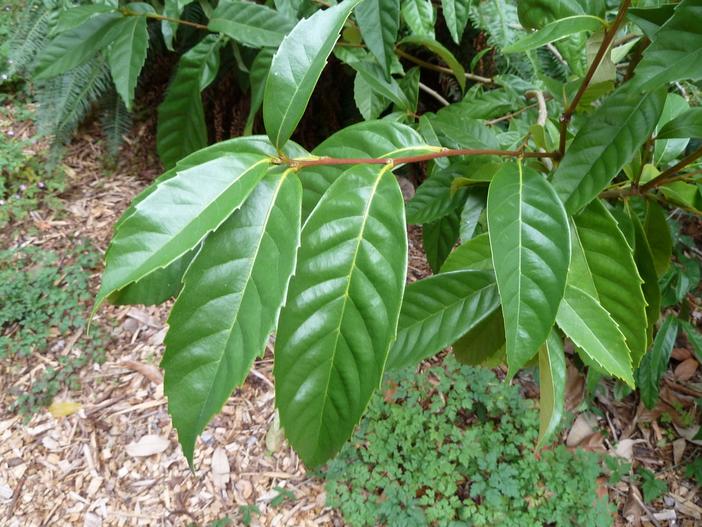Chinese Tanbark-Oak
(Castanopsis sclerophylla)
Chinese Tanbark-Oak (Castanopsis sclerophylla)
/
/

Wendy Cutler
CC BY-SA 2.0
Image By:
Wendy Cutler
Recorded By:
Copyright:
CC BY-SA 2.0
Copyright Notice:
Photo by: Wendy Cutler | License Type: CC BY-SA 2.0 | License URL: https://creativecommons.org/licenses/by-sa/2.0/ | Uploader: wlcutler | Publisher: Flickr




Estimated Native Range
Summary
Castanopsis sclerophylla, commonly known as Chinese tanbark-oak, is an evergreen tree native to broad-leaved evergreen forests and mixed woodland areas in southern China, typically found at elevations between 700 and 3,300 feet. It can grow up to 66 feet tall and is characterized by its glossy, thick, leathery leaves and attractive, flaky bark that adds textural interest. The tree produces inconspicuous yellowish-green flowers followed by small, spiny cupules containing edible nuts. These nuts are a traditional food source in China, often processed into a foodstuff similar to tofu. The nuts are also valued for their high tannin content, which is used in the tanning industry.
Chinese tanbark-oak is appreciated for its ornamental qualities, including its dense, rounded canopy and its ability to withstand urban pollution, making it suitable for street tree planting. It is also used in reforestation projects and as a shade tree in tea plantations. This species prefers well-drained, acidic to neutral soils and can tolerate partial shade to full sun conditions. It is hardy to USDA zone 7b and has been successfully cultivated in the southeastern United States. While generally low-maintenance, it can be susceptible to root rot in poorly drained soils and may require protection from strong winds due to its brittle wood.CC BY-SA 4.0
Chinese tanbark-oak is appreciated for its ornamental qualities, including its dense, rounded canopy and its ability to withstand urban pollution, making it suitable for street tree planting. It is also used in reforestation projects and as a shade tree in tea plantations. This species prefers well-drained, acidic to neutral soils and can tolerate partial shade to full sun conditions. It is hardy to USDA zone 7b and has been successfully cultivated in the southeastern United States. While generally low-maintenance, it can be susceptible to root rot in poorly drained soils and may require protection from strong winds due to its brittle wood.CC BY-SA 4.0
Plant Description
- Plant Type: Tree
- Height: 20-40 feet
- Width: 15-20 feet
- Growth Rate: Moderate
- Flower Color: Yellow
- Flowering Season: Spring
- Leaf Retention: Evergreen
Growth Requirements
- Sun: Full Sun, Part Shade
- Water: Medium
- Drainage: Medium
Common Uses
Edible*Disclaimer: Easyscape's listed plant edibility is for informational use. Always verify the safety and proper identification of any plant before consumption., Low Maintenance
Natural Habitat
Broad-leaved evergreen forests and mixed woodland areas in southern China
Other Names
Common Names: Chinese chinkapin, Lusterleaf chinkapin
Scientific Names: , Castanopsis sclerophylla, Castanopsis chinensis, Lithocarpus chinensis, Quercus chinensis, Quercus cuspidata var. sinensis, Quercus sclerophylla, Synaedrys sclerophylla,
GBIF Accepted Name: